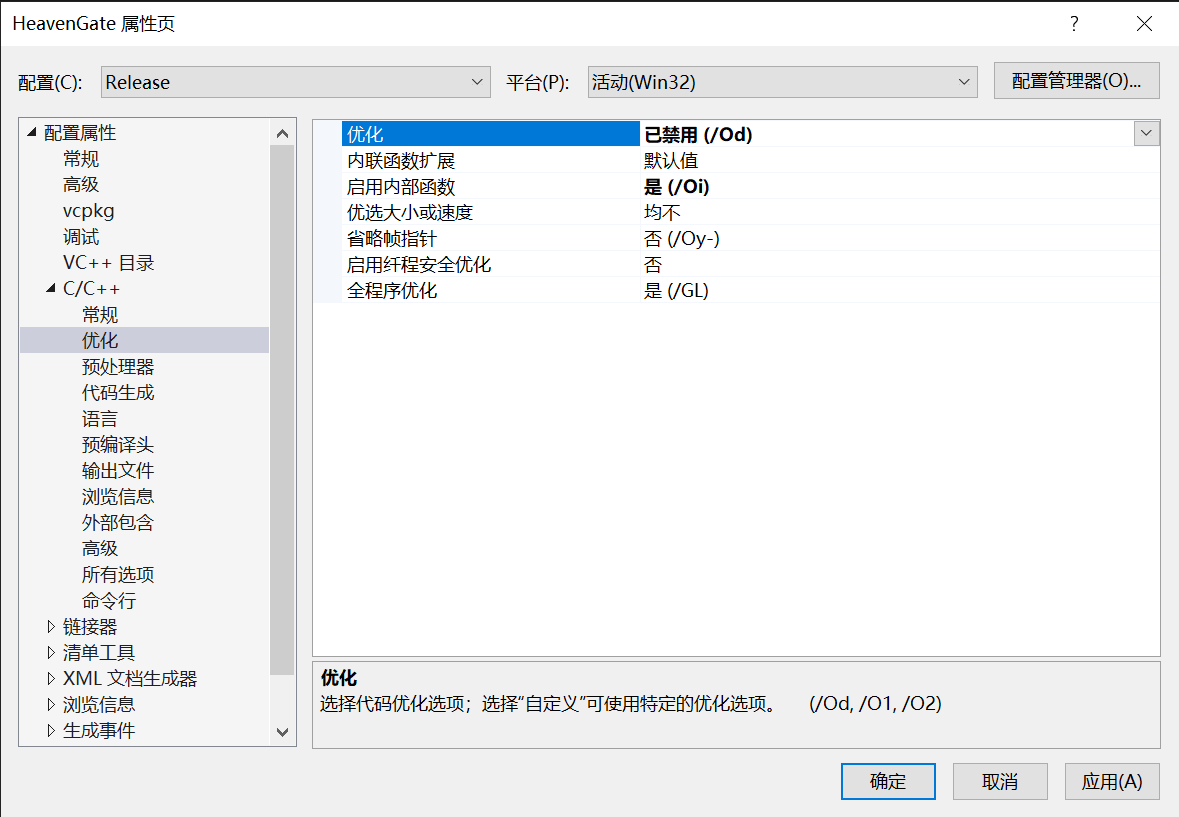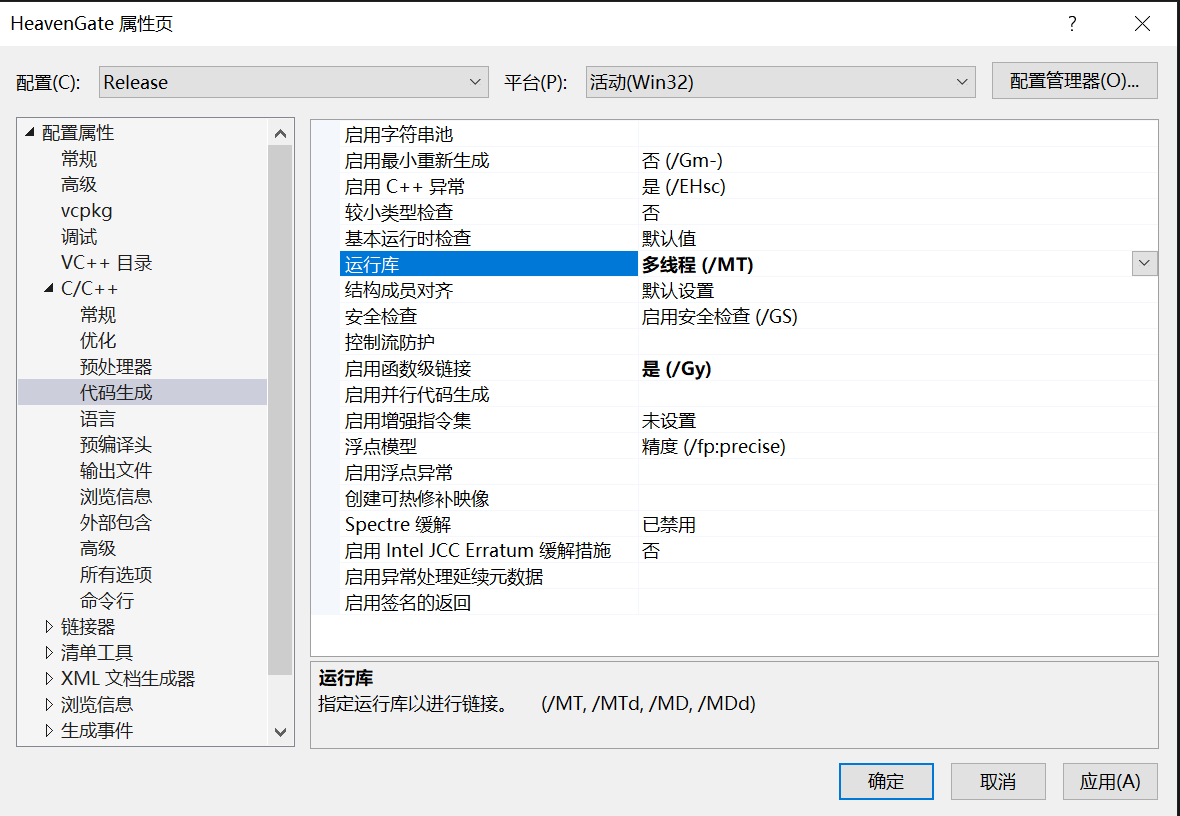天堂之门技术¶
在32位WoW64进程中执行64位代码,以及直接调用64位Win32API函数的技术。可以作为一种软件保护技术,防止静态分析以及跨进程API Hook,也可以绕过沙盒对于Win32 API调用的检测(因为大多数沙箱只hook 32位API)。
原理¶
Windows提供一种供32位程序在64位系统的机制WoW64,是64位系统为32位应用创建的模拟环境。
WoW64调用过程:
- 首先调用32位dll中的API
- 32位dllAPI调用相关模拟dll,如ntdll.dll就调用wow64cpu.dll中的X86SwitchTo64BitMode,切换模式
- wow64.dll将32位转化为64位系统调用
- 调用64位的对应API
- 切换到内核态(Ring0)执行系统调用
天堂之门即绕过WoW64的机制,手动切换到64位模式下并执行64位代码,流程:
- 使用
push 0x33 retf将cs寄存器设置为0x33,切换到64位模式 - 从
gs:[0x60]获取64位PEB - 从64位PEB中读取64位ntdll的基址
- 遍历ntdll64导出表,读取API地址
- 构造64位系统调用
其中为了加载其它API,还需要获取LoadLibrary和GetProcAddress的地址
- 遍历ntdll64,获取
LoadLibrary的地址 - 加载
kernel32.dll - 遍历
kernel32.dll导出表,得到GetProcAddress地址
这样就可以调用所有API了
代码¶
汇编代码使用keystone编译
import keystone.keystone as ks
code = '''
push 0x33
push 0x12345678
retf
'''
kst = ks.Ks(ks.KS_ARCH_X86, ks.KS_MODE_32)
asm, cnt = kst.asm(code)
print(code)
for b in asm:
print('0x' + hex(b)[2:].upper(), end=', ')
C代码使用VS编译,VS要设置Release并关闭优化

并且要设置为静态编译,多线程

#include <inttypes.h>
#include <stdio.h>
#include <Windows.h>
void memcpy64(uint64_t dst,uint64_t src,uint64_t sz) {
static uint8_t code[] = {
/* [bits 32]
push 0x33
push _next_x64_code
retf # retf 相当于pop cs; retn;
# cs为0x33时让CPU以64位执行指令,为0x23时让CPU以32位执行指令
*/
0x6A, 0x33, 0x68, 0x78, 0x56, 0x34, 0x12, 0xCB,
/* [bits 64]
push rsi
push rdi
mov rsi, src
mov rdi, dst
mov rcx, sz
rep movsb
pop rsi
pop rdi
*/
0x56, 0x57,
0x48, 0xBE, 0x88, 0x77, 0x66, 0x55, 0x44, 0x33, 0x22, 0x11,
0x48, 0xBF, 0x88, 0x77, 0x66, 0x55, 0x44, 0x33, 0x22, 0x11,
0x48, 0xB9, 0x88, 0x77, 0x66, 0x55, 0x44, 0x33, 0x22, 0x11,
0xF3, 0xA4,
0x5E, 0x5F,
/* [bits 64]
push 0x23 # 切换回32位
push _next_x86_code
retfq # 表示返回到64位地址
*/
0x6A, 0x23, 0x68, 0x78, 0x56, 0x34, 0x12, 0x48, 0xCB,
/* [bits 32]
ret
*/
0xC3
};
static uint32_t ptr = NULL;
if (!ptr) {
ptr = (uint32_t)VirtualAlloc(NULL, sizeof(code), MEM_COMMIT | MEM_RESERVE, PAGE_EXECUTE_READWRITE);
for (int i = 0; i < sizeof(code); i++) ((uint8_t*)ptr)[i] = code[i];
}
*(uint32_t*)(ptr + 3) = ptr + 8;
*(uint64_t*)(ptr + 12) = src;
*(uint64_t*)(ptr + 22) = dst;
*(uint64_t*)(ptr + 32) = sz;
*(uint32_t*)(ptr + 47) = ptr + 53;
((void(*)())ptr)();
}
void GetPEB64(void* peb64) {
static uint8_t code[] = {
/* [bits 32]
mov esi, peb64
push 0x33
push _next_x64_code
retf
*/
0xBE, 0x78, 0x56, 0x34, 0x12, 0x6A, 0x33, 0x68, 0x78, 0x56, 0x34, 0x12, 0xCB,
/* [bits 64]
mov rax, gs:[0x60] # 64位模式下,gs:[0x30]指向TEB,gs:[0x60]指向PEB
mov [esi], rax
*/
0x65, 0x48, 0xA1, 0x60, 0x0, 0x0, 0x0, 0x0, 0x0, 0x0, 0x0, 0x67, 0x48, 0x89, 0x6,
/* [bits 64]
push 0x23
push _next_x86_code
retfq
*/
0x6A, 0x23, 0x68, 0x78, 0x56, 0x34, 0x12, 0x48, 0xCB,
/* [bits 32]
ret
*/
0xC3
};
static uint32_t ptr = NULL;
if (!ptr) {
ptr = (uint32_t)VirtualAlloc(NULL, sizeof(code), MEM_COMMIT | MEM_RESERVE, PAGE_EXECUTE_READWRITE);
for (int i = 0; i < sizeof(code); i++) ((PBYTE)ptr)[i] = code[i];
}
*(uint32_t*)(ptr + 1) = (uint32_t)peb64;
*(uint32_t*)(ptr + 8) = ptr + 13;
*(uint32_t*)(ptr + 31) = ptr + 37;
((void(*)())ptr)();
}
uint64_t GetModuleHandle64(const WCHAR* moduleName) {
uint64_t peb64;
/* nt!_PEB_LDR_DATA
+0x000 Length : Uint4B
+0x004 Initialized : UChar
+0x008 SsHandle : Ptr64 Void
+0x010 InLoadOrderModuleList : _LIST_ENTRY
*/
uint64_t ldrData;
/*
ptr to InLoadOrderModuleList
*/
uint64_t head;
/*
typedef struct _LDR_MODULE {
+0x000 LIST_ENTRY InLoadOrderModuleList;
+0x010 LIST_ENTRY InMemoryOrderModuleList;
+0x020 LIST_ENTRY InInitializationOrderModuleList;
+0x030 PVOID BaseAddress;
+0x038 PVOID EntryPoint;
+0x040 ULONG SizeOfImage;
+0x048 UNICODE_STRING FullDllName;
+0x058 UNICODE_STRING BaseDllName;
...
} LDR_MODULE, *PLDR_MODULE;
*/
uint64_t pNode;
GetPEB64(&peb64);
memcpy64((uint64_t)&ldrData, peb64 + 0x18, 8); // PEB+0x18为LDR地址
head = ldrData + 0x10; // LDR+0x10为InLoadOrderModuleList地址
memcpy64((uint64_t)&pNode, head, 8);
while (pNode != head) { // 遍历InLoadOrderModuleList
uint64_t buffer;
memcpy64((uint64_t)(unsigned)(&buffer), pNode + 96, 8); // tmp = pNode->BaseDllName->Buffer
if (buffer) {
WCHAR curModuleName[32] = { 0 };
memcpy64((uint64_t)curModuleName, buffer, 60); // 获取模块名
if (!lstrcmpiW(moduleName, curModuleName)) { // 比对moduleName
uint64_t base;
memcpy64((uint64_t)&base, pNode + 48, 8);
return base;
}
}
memcpy64((uint64_t)&pNode, pNode, 8); // pNode = pNode->Flink
}
return NULL;
}
uint64_t _GetProcAddress64(uint64_t hModule, const char* func) {
IMAGE_DOS_HEADER dos;
memcpy64((uint64_t)&dos, hModule, sizeof(dos));
IMAGE_NT_HEADERS64 nt;
memcpy64((uint64_t)&nt, hModule + dos.e_lfanew, sizeof(nt));
IMAGE_EXPORT_DIRECTORY expo;
memcpy64((uint64_t)&expo, hModule + nt.OptionalHeader.DataDirectory[0].VirtualAddress, sizeof(expo));
for (uint64_t i = 0; i < expo.NumberOfNames; i++) {
DWORD pName;
memcpy64((uint64_t)&pName, hModule + expo.AddressOfNames + (4 * i), 4);
char name[64] = { 0 };
memcpy64((uint64_t)name, hModule + pName, 64);
if (!lstrcmpA(name, func)) {
WORD ord;
memcpy64((uint64_t)&ord, hModule + expo.AddressOfNameOrdinals + (2 * i), 2);
uint32_t addr;
memcpy64((uint64_t)&addr, hModule + expo.AddressOfFunctions + (4 * ord), 4);
return hModule + addr;
}
}
return NULL;
}
uint64_t X64Call(uint64_t proc, uint32_t argc, ...) {
uint64_t* args = (uint64_t*)(&argc + 1);
uint64_t ret = 0;
static uint8_t code[] = {
/* [bits 32]
push ebx
mov ebx, esp
and esp, 0xFFFFFFF8
push 0x33
push _next_x64_code
retf
*/
0x53, 0x89, 0xE3, 0x83, 0xE4, 0xF8,
0x6A, 0x33, 0x68, 0x78, 0x56, 0x34, 0x12, 0xCB,
/* [bits 64]
push rsi
push rdi
mov rsi, args
mov rcx, [rsi]
mov rdx, [rsi+8]
mov r8, [rsi+16]
mov r9, [rsi+24]
mov rax, argc
args_start:
cmp rax, 4
jle args_end
mov rdi, [rsi+8*rax-8]
push rdi
dec rax
jmp args_start
args_end:
mov rax, proc
sub rsp, 32
call rax
mov rdi, &ret
mov [rdi], rax
pop rdi
pop rsi
*/
0x56, 0x57,
0x48, 0xBE, 0x88, 0x77, 0x66, 0x55, 0x44, 0x33, 0x22, 0x11, 0x48, 0x8B, 0xE, 0x48, 0x8B, 0x56, 0x8, 0x4C, 0x8B, 0x46, 0x10, 0x4C, 0x8B, 0x4E, 0x18,
0x48, 0xB8, 0x88, 0x77, 0x66, 0x55, 0x44, 0x33, 0x22, 0x11, 0x48, 0x83, 0xF8, 0x4, 0x7E, 0xB, 0x48, 0x8B, 0x7C, 0xC6, 0xF8, 0x57, 0x48, 0xFF, 0xC8, 0xEB, 0xEF,
0x48, 0xB8, 0x88, 0x77, 0x66, 0x55, 0x44, 0x33, 0x22, 0x11, 0x48, 0x83, 0xEC, 0x20, 0xFF, 0xD0,
0x48, 0xBF, 0x88, 0x77, 0x66, 0x55, 0x44, 0x33, 0x22, 0x11, 0x48, 0x89, 0x7,
0x5F, 0x5E,
/* [bits 64]
push 0x23
push _next_x86_code
retfq
*/
0x6A, 0x23, 0x68, 0x78, 0x56, 0x34, 0x12, 0x48, 0xCB,
/* [bits 32]
mov esp, ebx
pop ebx
ret
*/
0x89, 0xDC, 0x5B,
0xC3
};
static uint32_t ptr = NULL;
if (!ptr) {
ptr = (uint32_t)VirtualAlloc(NULL, sizeof(code), MEM_COMMIT | MEM_RESERVE, PAGE_EXECUTE_READWRITE);
for (int i = 0; i < sizeof(code); i++) ((PBYTE)ptr)[i] = code[i];
}
*(uint32_t*)(ptr + 9) = ptr + 14;
*(uint64_t*)(ptr + 18) = (uint64_t)args;
*(uint64_t*)(ptr + 43) = (uint64_t)argc;
*(uint64_t*)(ptr + 70) = proc;
*(uint64_t*)(ptr + 86) = (uint64_t)&ret;
*(uint32_t*)(ptr + 102) = ptr + 108;
((void(*)())ptr)();
return ret;
}
char* MakeUTFStr(const char* str) {
uint32_t len = lstrlenA(str);
char* out = (char*)malloc(16 + (len + 1) * 2);
*(uint16_t*)(out) = (uint16_t)(len * 2); //Length
*(uint16_t*)(out + 2) = (uint16_t)((len + 1) * 2); //Max Length
uint16_t* outstr = (uint16_t*)(out + 16);
for (uint32_t i = 0; i <= len; i++) outstr[i] = str[i];
*(uint64_t*)(out + 8) = (uint64_t)(out + 16);
return out;
}
uint64_t GetKernel32() {
static uint64_t kernel32 = 0;
if (kernel32) return kernel32;
uint64_t ntdll = GetModuleHandle64(L"ntdll.dll");
uint64_t LdrLoadDll = _GetProcAddress64(ntdll, "LdrLoadDll");
char* str = MakeUTFStr("kernel32.dll");
X64Call(LdrLoadDll, 4, (uint64_t)0, (uint64_t)0, (uint64_t)str, (uint64_t)(&kernel32));
return kernel32;
}
uint64_t GetProcAddress64(uint64_t module, const char* func) {
static uint64_t K32GetProcAddress = 0;
if (!K32GetProcAddress)K32GetProcAddress = _GetProcAddress64(GetKernel32(), "GetProcAddress");
return X64Call(K32GetProcAddress, 2, module, (uint64_t)func);
}
uint64_t LoadLibrary64(const char* name) {
static uint64_t LoadLibraryA = 0;
if (!LoadLibraryA) LoadLibraryA = GetProcAddress64(GetKernel32(), "LoadLibraryA");
return X64Call(LoadLibraryA, 1, (uint64_t)name);
}
void Test() {
uint64_t kernel32 = GetKernel32();
uint64_t user32 = LoadLibrary64("user32.dll");
uint64_t MessageBox64 = GetProcAddress64(user32, "MessageBoxA");
X64Call(MessageBox64, 4, (uint64_t)NULL, (uint64_t)"Wowowowowow", (uint64_t)"Wowowowowow", (uint64_t)NULL);
}
int main() {
Test();
}
需要双击打开才可以看到效果
参考¶
https://rce.co/knockin-on-heavens-gate-dynamic-processor-mode-switching/
https://s.itho.me/ccms_slides/2021/5/13/a23144e3-4313-4b9b-89c2-985fb3832b4e.pdf